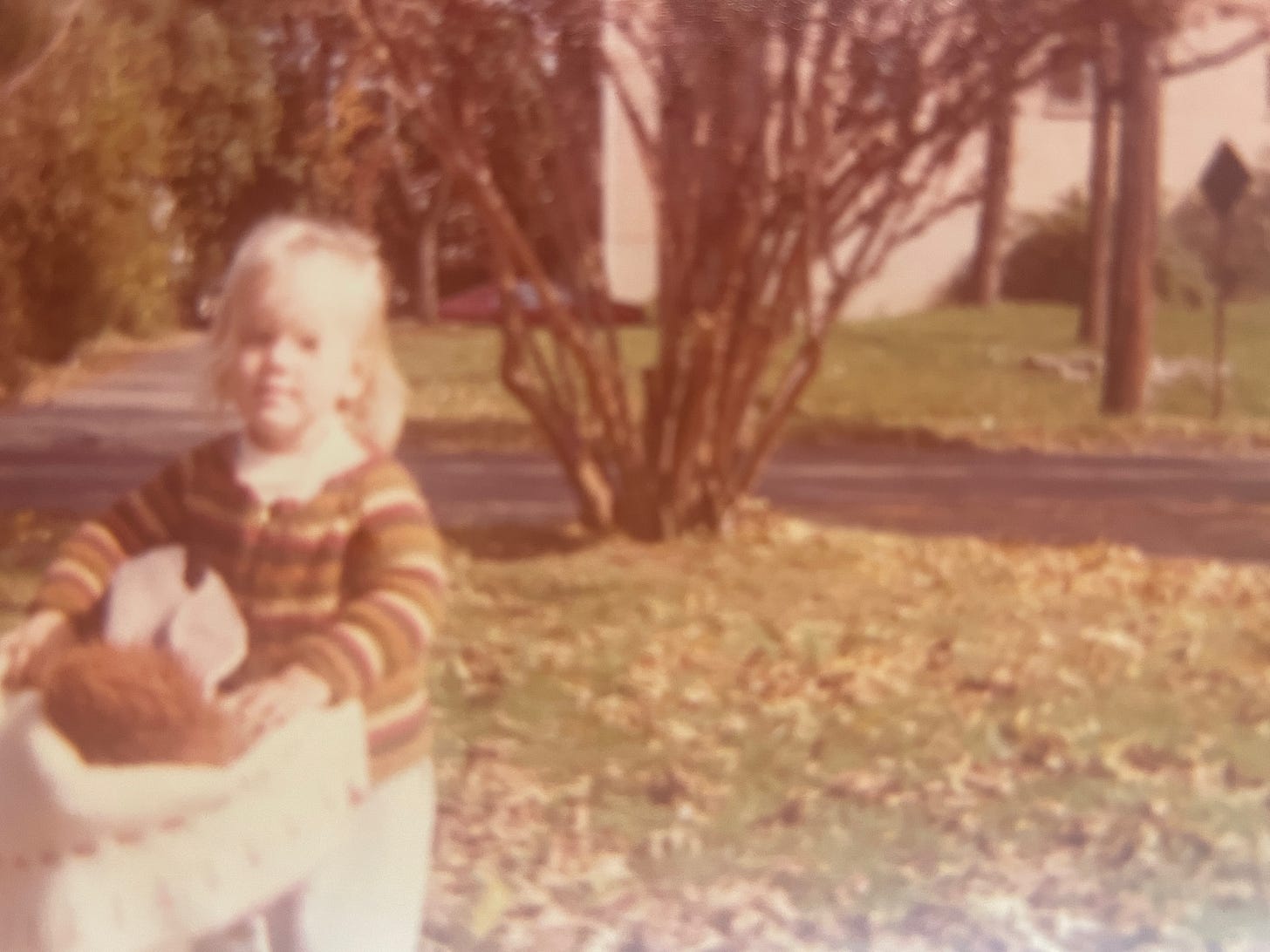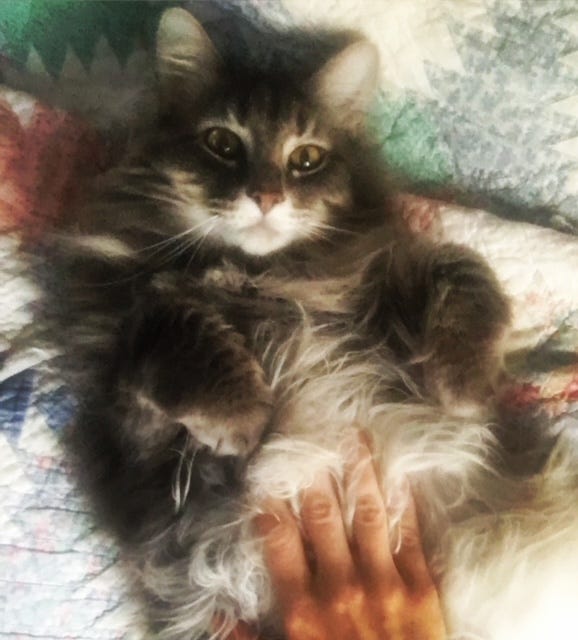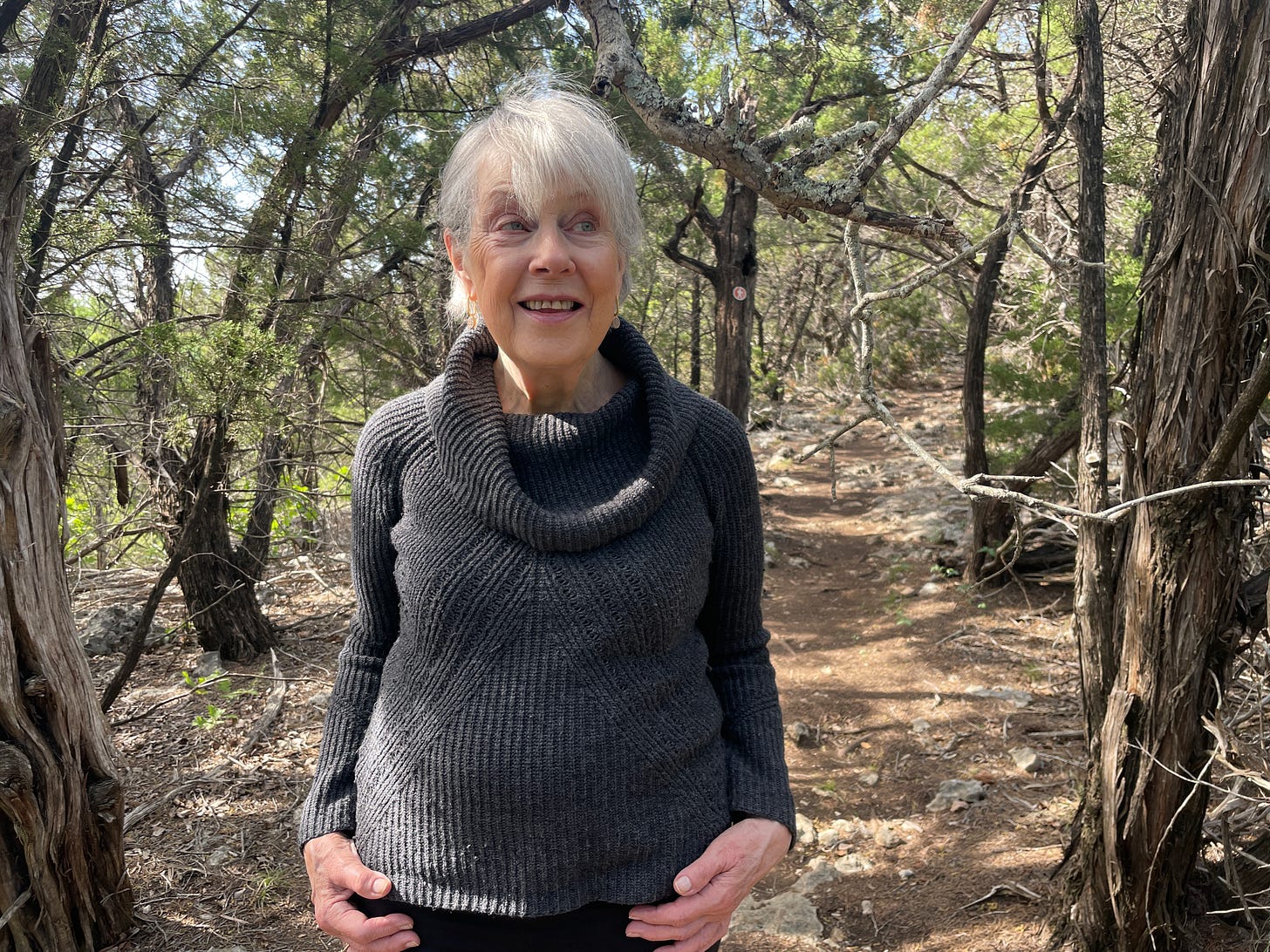On Not Being a Mother
I always wanted to have children, I had every intention of having children, I assumed children were a kind of a birth right — until I did not.
by Sarah Hepola
This story was originally posted on May 7, 2022, when SMOKE EM IF YOU GOT EM was but a few months old. We’re posting it again for anyone who missed it the first time, or anyone who’d like to read it again.
A few years ago, I took a friend to a Korean Spa for her birthday in mid-May. We spent hours chatting in the swampy whirlpool, whispering like girls at a sleepover inside the dry saunas decorated in pyramid themes like a wellness version of EPCOT. I sprang for massages, and I stripped down to my underwear and lay on a padded table as a man with strong hands worked out the kinks in my back, but when I got up to leave, he said something that put them back again.
“Happy Mother’s Day.”
I must have known it was Mother’s Day weekend. I have a mother, after all, and Mother’s Day has always been a benign obligation: Flowers and brunches and brainstorms with my older brother where someone floated an idea, and the other person basically said yes. But then again, maybe I had not known it was Mother’s Day weekend, because the holiday had little use to me, a professionally busy person in her 40s who never had a child, a fact that continued to surprise me.
I’m not a mother, I started to snap, and stopped myself, because that would be rude. I’ll tell my mom you said so, I started to say, and stopped myself, because that would be weird. Tears spiked; they do that when emotion wallops rationale. “Thanks,” I told him, and stomped downstairs to find my friend, who was blissfully departing a dim room where strangers massaged her feet, and I didn’t have to tell her something was wrong, because she read it on my face. My friend is so much like me that we joke we’re sisters: Both 5’2”, both fiery and sweet, both blonde and blue-eyed, I could go on about our common traits, but one was relevant in that moment. Neither of us has children.
“That motherfucker told me Happy Mother’s Day,” I told her.
I always wanted to be a mother. I was a girl, a very girly one, who swooned for pink and glitter, much to the confusion of my earth-tone mom. “You used to carry your dolly with you wherever you went,” my mother likes to tell me, in the sing-song tone that drifts into her voice when she talks about my toddlerhood. Pictures of my brother at four show him skidding across dirt, kicking a ball, posing as a fireman, but there I am, pushing a baby stroller with a Raggedy Ann inside like a goddamn gender cliche.
Was the maternal urge a story about socialization, or a story about biological mandates that socialization cannot unwind? I once asked my mother to describe her children in one word. “Curious” she said of my brother, who grew up to be an engineer. I waited for my word. “Sensitive,” she said, and my face fell, because his word was so much cooler than mine, thus proving how accurate her description.
The fact that I never became a mother is both a personal story and a cultural one, like most things I write. It’s about choices, and choices you don’t get to make. It’s about the unintended consequences of feminism, but also Western affluence, because the fertility rate declines as people get richer, more comfortable. The data is pretty strong: The more we have, the more we live alone.
The particular question of how I didn’t become a mother — or a wife, another label I wanted, even as some women treated it like a slur — the particular question of ex-boyfriends and work obligations and love lost and freedom gained was so deep and twisty it was the subject of my second memoir, whose knots I was slowly untangling in the quiet hours before the others woke (not that anyone else lived in my house, aside from a fluffy gray cat named Wallace).
Most of my friends are mothers. A few are single, but the majority are still married, for better or worse. They love being a mother, or they do not; motherhood is one hell of a dynamic, good luck roping it with one verb. But I have yet to meet the woman who really digs Mother’s Day. I thought of it as a loser’s holiday, invented to make women feel better only to make them feel worse. The flowers were too expensive, or the wrong flowers, or there were no flowers at all. The brunch was lousy, or was too fattening (because calories), or the brunch was something the women had to make themselves, because they were the mothers.
Several friends lost moms as we edged into middle age, and Mother’s Day brought a sting for them. I made a point to text them on Mother’s Day, but then so many friends lost mothers that it started to feel like a holiday for grieving adults, and I quietly resolved to simply appreciate that my mother was still here. (And so was my father, a quiet and nice man.) My mother was healthy, compassionate, the kind of mother most people would love to have.
And so the curdling of Mother’s Day from a holiday that was about other people into one that was specifically about me — or whatever I had not become — was a sour turn. My friend and I ordered Korean food in the small dining area of the spa. I got beef bulgogi, even though I’d slid to the heavier end of the scale (a pebble in my shoe at all times), but I liked the seasoned meat on the sticky white rice, and I picked at it with chopsticks, trying to lighten my mood.
“Tell me this isn’t about weight,” my friend said, but of course it was about weight, because everything was for me. A man had seen my body and determined it was a mother’s body. The white squiggle of stretch marks down my upper thighs, the voluminous breasts, the soft pudge of the lower abdomen — “subcutaneous layer of Matron,” Tom Wolfe called it, and I never forgave him for the accuracy. Whenever I grew anxious about my body, the younger men I dated called me a MILF, a term meant to flatter, except I was not an M. Couldn’t I just be an ILF? Why did every attempt to lift me sink me instead? You look hot for your age. I think older women are sexy. Behold my dark magic: Take a compliment, and turn it into an insult.
The weight, though. That was a tough one. Are you pregnant? When are you expecting? It had happened more than once. I spent much of my early adulthood carrying 20 to 50 extra pounds, and the weight made me look motherly, or maybe it made me dress motherly (cardigans, elastic waistbands), who’s to say what begat what? I was 36 when I moved back to Dallas, newly sober after six years of vodka martinis in New York City. One late afternoon, I bought three gallons of paint in three vibrant colors at Home Depot, and as the guy in the orange apron hammered a lid into place, he said, “Are your kids gonna help with this?”
I looked behind me. Was he talking to someone else? I wondered if children were scampering in my periphery, but no, it was just 3pm on a Tuesday (mother’s shopping hours), and I was back in Texas, where people my age were married with kids, as opposed to New York City, where people my age still had for-real conversations about how maybe they weren’t ready for that kind of commitment. I was wearing a loose empire-waist cotton dress, in fashion that season, and I decided this was the fatal detail, and I lost weight not long after that. About 50 pounds; it transformed the way people saw me, and the way I saw myself. I wore snug tank tops and mini skirts with saucy red heels, and this never happened again, the casual but devastating mis-categorization of my time on earth. People asked if I had children. Of course they did. But they didn’t assume it, because look at the cleavage, look at the swagger, look at the sporty red Honda, or maybe because the house was re-painted by then, and I never went back to the testosterone fields of Home Depot at 3pm on a weekday to buy paint in pink and teal as though I were dyeing giant Easter eggs.
I was 40 years old when I put out a memoir. It was a creative birth, one for which I’m immensely grateful, and in the years after that book arrived in the world (2015), my attention turned toward another kind of conception. I was 41, then 42, and these are not good years to contemplate being the mother you assumed you’d be. I cried in my therapist’s office. I cried sitting across from a fertility specialist in Manhattan with kind eyes and a box of Kleenex on the corner of his desk. The office had a sweeping view of the skyscrapers flanking Central Park. This part is not interesting (not to me anyway), but I do talk about it in the book I’m still untangling in the pre-dawn, because it was not a story I’d read: A woman who wanted to have children, who meant to have children, who thought children were a kind of birth right — until she did not.
My life was good in these years. (Follow me on Instagram.) I got a travel assignment to Patagonia to track mountain lions; I got a travel assignment to Rwanda to see endangered mountain gorillas. It was wild and beautiful and lonelier than I cared to admit. I texted friends back home who were mothers, and it felt like two sides of the green grass having a correspondence. Those women talked about birthday parties, play dates, cheer practice, and I talked about luxury tubs so big they nearly embarrassed me, and each of us ached in silent ways, but nobody wanted to trade, not really, because in the end, our lives were our own.
I dated a lot of men. They got younger and younger, which was awesome, and maybe worrisome, but also a good time. There was one in particular, a potent mix of masculine and tender; he hooked me bad. Fourteen years between us, though the age gap mostly felt like nothing. One night, I sat on the squishy brown couch of his bachelor’s pad, and he told me he never wanted kids, and I thought: Dammit. And I thought: Good, because I probably can’t have them. And I thought: Nobody knows what they want. I’ve seen too many people swear up and down they didn’t want kids only to watch their hearts grow bigger when they had them.
Three years have passed since that night on his couch, and he’s engaged to a woman who is not me, and that discovery hurt, but then again maybe it’s a gift, because the worst part is you never know. Were we just never meant to be? Is there such a thing as “meant to be”? He sent me a video of Christopher Hitchens the other day, because we still text from time to time. Books, culture, the drip of our days. The clip was from a speech Hitch gave near the end of his life. His head is shaved bald, his hedonist’s figure shrunken, but his voice is strong.
“To me the offer of certainty, the offer of complete security, the offer of impermeable faith that can’t give way is an offer of something not worth having,” Hitch said, and I wondered how the younger man always knew what I needed to hear, and I understood that I would watch this clip again the second it finished. “I want to live my life taking the risk all the time that I don’t know anything like enough yet. That I haven’t understood enough. That I can’t know enough. That I’m always hungrily operating on the margins of some potentially great harvest of future knowledge and wisdom. I wouldn’t have it any other way.”
Hitchens was a father, though he rarely wrote about it. Fatherhood wasn’t the point — writing, thinking, discovery, that was the point — and maybe that’s a sad story, or maybe that’s a triumphant story, but anyway, it’s his. I’ve yet to meet a man as corkscrewed about fatherhood as I am about motherhood, though I’ve met a few carrying grief for the family they never had, or the family they had and could not quite love enough. They are gay men, they are straight men, their songs are mine in a different key. Choices, not choices. Who can measure what we lost, what we gained?
I had an abortion once. I was 30 years old, an age that struck me as old at the time. I talked about this in a podcast with Nancy once. The furor over Roe v. Wade nudged out my secret, though it was one I’d been planning to tell, and afterward, my body was so jangly that I chain-smoked like I was huffing paint. I drove to an interview an hour south of Dallas, grateful to focus on somebody else, but that earlier conversation never stopped moving through my body. I lay in bed that night, hand draped over my eyes, the fluffy gray cat nuzzling against me and then darting to some other room, coming and going as he pleased (must be nice). I wanted the abortion story in the world, but I wanted to clutch it to my chest, and I couldn’t do both, so the podcast shipped the next morning as planned. Done deal.
It was around noon when an email arrived from a stranger, thanking me. She’d never had an abortion, but she’d had miscarriages and struggled with infertility — she was one of a vast army of people whose life did not turn out as planned — and she, too, marked time by the children she never had.
“There are so few stories in this space,” she wrote. “It’s a cultural black hole, and dear lord does it make people uncomfortable. The two scripts are to have kids or to have made a righteous feminist decision to live child free, and everything in the middle is treated as unfinished, unresolved, incomplete.”
Yes, that. Yes, thank you. But we are all unfinished, we are all unresolved, we are all incomplete, at least if we’re still alive. I forwarded the message to Nancy, who is like my mother, but I only mean that I love her, that she is both gentle and strong, that she has a radiant maternal energy, that I turn to her when I’m hurting, that she seems to possess insight I have yet to discover, that she inspires me to be better, which is the way many people would describe me, which is to say that I am a mother, even if I never have children. That we are all mothers, in some way or another, if we want to be.









God damn this is beautiful writing, and something—as a happily married man of seven years with no kids and two cats—I think about more and more. I’m really glad I subscribed to this podcast. Cheers from Cape Town.
Gah, that particular Hitchens quote gets me every time. If I'm not mistaken...he was in Dallas in that clip (debating at Prestonwood Church). It always makes me feel less alone, as did this piece. So thank you.